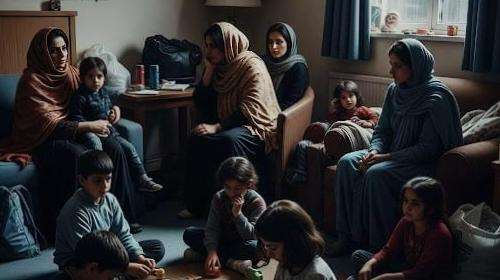Thousands of Afghan asylum seekers are trapped in the UK in a bureaucratic limbo, unable to be granted refugee status or returned to their home country. This humanitarian crisis has been exacerbated by a significant drop in the UK's asylum grant rate for Afghans and a policy conflict that has left many in a state of indefinite uncertainty.
A System Caught in Contradiction
In the year leading up to June 2025, the UK Home Office refused 6,066 asylum claims from Afghans, including 367 women and girls. This follows a dramatic shift in policy that saw the grant rate for Afghan asylum applications plummet from nearly 99% at the end of 2023 to just 37% in the first half of 2025. The change is linked to a revised "country policy and information note" from September 2024, which states that a "vague or non-specific fear of the Taliban" is not sufficient for a successful asylum claim, despite the well-documented human rights abuses faced by women and girls under the Taliban regime.
At the same time, the Home Office has declared that it cannot deport these refused asylum seekers back to Afghanistan because the UK government does not recognize the Taliban administration. This creates an impossible "Catch-22" scenario where individuals are deemed to be not at risk in Afghanistan but are simultaneously unable to be returned there. An immigration lawyer from Duncan Lewis solicitors, Jamie Bell, highlighted this contradiction, stating that these people are "completely reliant on the UK government for any sort of subsistence because they are not allowed to work."
The Human and Financial Cost of Limbo
The number of Afghan nationals waiting for an initial decision on their asylum claims at the end of June was 6,784. Given the recent low grant rates, an estimated 4,274 more people could be added to the backlog of those in limbo, potentially pushing the total to over 10,000. These individuals are often housed in hotels or other temporary accommodations, with 3,664 Afghans living in hotels and a further 6,103 in other "dispersal accommodation" as of late June. An additional 4,900 have been placed in "transitional accommodation," which is also often hotels. The cost of this reliance on temporary housing is significant.
The Home Office has not released data on asylum appeals since May 2023, so the exact number of individuals appealing their rejected claims is unknown. However, experts believe many are still stuck in the system. The majority of Afghans are arriving in the UK via small boats, with 8,281 asylum seekers from Afghanistan arriving this way in the first six months of 2025 alone.
Political and Charitable Responses
The crisis has become a focal point for political debate. In recent comments, Labour leader Starmer promised to "detain and send back" small boat migrants, but the conflicting policies on Afghanistan make this particularly difficult. Similarly, Reform UK leader Nigel Farage's suggestion to pay the Taliban to accept the return of asylum seekers was met with an initial "off the table" response from Downing Street, although sources later described the reports as "overblown."
The Refugee Council has proposed a solution to alleviate the strain on the system and end the use of asylum hotels. The charity has called for a temporary leave to remain for people from Afghanistan, Eritrea, Iran, Sudan, and Syria who are already in the asylum system. This would allow them to work, contribute to the economy, and reduce the financial burden on the UK government while their cases are processed. This proposal is based on the rationale that these nationalities are highly likely to be granted asylum and cannot be returned to their home countries.
Despite the complexities, the Home Office maintains that it is working to fix a "chaotic asylum system" and has noted that "most Afghan women who claim asylum are successful" under the country's guidance, which acknowledges that women are a target group for the Taliban. This is a point of contention given the low grant rates and the high number of refusals.
_4.jpg)
_2.jpg)

_2.jpg)
_3.jpg)



.svg)


_3.jpg)